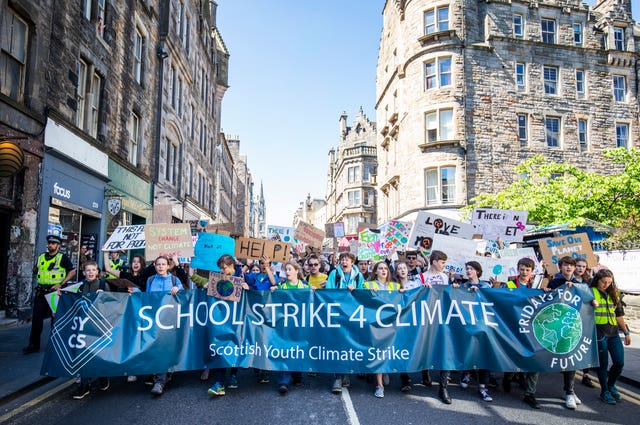
Scotland’s largest teaching union is urging local authorities not to punish pupils who take part in youth climate strikes on Friday.
Youngsters are taking part in more than 150 demonstrations around the UK calling for action on climate change as part of a global movement inspired by teenage activist Greta Thunberg.
READ MORE: The full list of climate strikes taking place across Scotland
The Educational Institute of Scotland (EIS) has written to Scotland’s 32 local authorities urging them to respect pupils’ rights to take part in the action.
 Young people taking part in a previous strike in Edinburgh (Jane Barlow/PA)
Young people taking part in a previous strike in Edinburgh (Jane Barlow/PA)
Edinburgh City Council last month announced pupils will only be authorised to miss school to go on climate strikes once a year, saying regularly missing school could affect their education.
In the letter, EIS general secretary Larry Flanagan said: “Whilst the EIS is not encouraging pupils/students to participate in anti-climate change strikes, we recognise that many will do so.
“We believe that their right to do so should be respected and that participants should not be sanctioned or punished as a consequence.
“If we are to encourage our pupils to be confident individuals that effectively contribute to society on global themes including sustainability, we shouldn’t seek to punish them when they campaign for global sustainability.”
On Friday, there will be major marches in Edinburgh and Glasgow, as well as demonstrations in many other locations around Scotland including Inverness, Fort William and Lerwick.
Oxfam Scotland said reducing emissions quickly in the next 10 years is essential to help prevent the climate emergency from becoming a “global climate catastrophe.”
Jamie Livingstone, head of Oxfam Scotland, said: “From the surge in support for Greta Thunberg to the global school strike movement, it is inspiring to see the next generation demand urgent and sustained action on the climate crisis.
“Having helped to cause this crisis, rich countries like Scotland have a moral obligation to the world’s poorest countries where the current generation is already living with the life and death consequences of decades of inaction.
“Young people around the globe, including in Scotland, know this is wrong and that things need to change.
“We’ll be joining these huge marches on Scotland’s streets because the climate emergency requires an emergency response and we want to echo the school strikers’ call to world leaders to match rhetoric with immediate and lasting policy changes.”
 Swedish schoolgirl Greta Thunberg has inspired the movement (Victoria Jones/PA)
Swedish schoolgirl Greta Thunberg has inspired the movement (Victoria Jones/PA)
The Church of Scotland has called on adults to listen to young people’s concerns about climate change and try to understand why they are profoundly worried about the future.
Rev Dr Richard Frazer, convener of the Church and Society Council, said: “Climate change will change the lives of children growing up today and they will experience profoundly the impact in decades to come.
“It now casts a long shadow over their lives and they have responded to the inspiring example of the Swedish schoolgirl Greta Thunberg and want to be heard.
“We are mindful of the many arguments for and against schoolchildren ‘striking’ and appreciate the strong feelings this evokes.
READ MORE: Demand for post-Brexit environment protection laws as Scots show support in poll
“Rather than taking a stand for or against climate strikes, we urge churches and congregations to listen to children in their communities.”
A Scottish Government spokesman said: “We are pleased to see our young people actively engaging on the issue of climate change but student absence is rightly a matter for individual schools to consider.
“The global climate emergency and a Green New Deal for Scotland are at the centre of our Programme for Government.
“We are leading by example through bold actions. We are redoubling our efforts and we will end Scotland’s contribution to global climate change by 2045.”



Why are you making commenting on The Herald only available to subscribers?
It should have been a safe space for informed debate, somewhere for readers to discuss issues around the biggest stories of the day, but all too often the below the line comments on most websites have become bogged down by off-topic discussions and abuse.
heraldscotland.com is tackling this problem by allowing only subscribers to comment.
We are doing this to improve the experience for our loyal readers and we believe it will reduce the ability of trolls and troublemakers, who occasionally find their way onto our site, to abuse our journalists and readers. We also hope it will help the comments section fulfil its promise as a part of Scotland's conversation with itself.
We are lucky at The Herald. We are read by an informed, educated readership who can add their knowledge and insights to our stories.
That is invaluable.
We are making the subscriber-only change to support our valued readers, who tell us they don't want the site cluttered up with irrelevant comments, untruths and abuse.
In the past, the journalist’s job was to collect and distribute information to the audience. Technology means that readers can shape a discussion. We look forward to hearing from you on heraldscotland.com
Comments & Moderation
Readers’ comments: You are personally liable for the content of any comments you upload to this website, so please act responsibly. We do not pre-moderate or monitor readers’ comments appearing on our websites, but we do post-moderate in response to complaints we receive or otherwise when a potential problem comes to our attention. You can make a complaint by using the ‘report this post’ link . We may then apply our discretion under the user terms to amend or delete comments.
Post moderation is undertaken full-time 9am-6pm on weekdays, and on a part-time basis outwith those hours.
Read the rules here